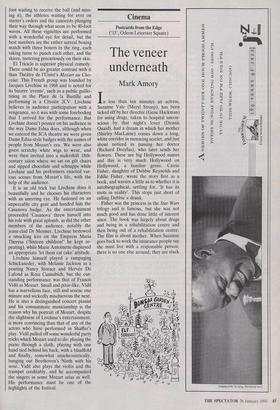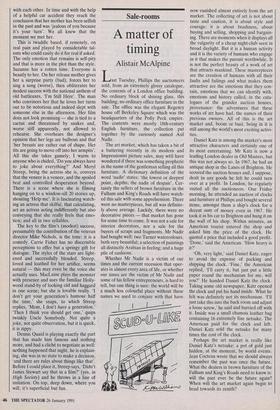Cinema
Postcards from the Edge (`15', Odeon Leicester Square)
The veneer underneath
Mark Amory
In less than ten minutes an actress, Suzanne Vale (Meryl Streep), has been ticked off by her director (Gene Hackman) for using drugs, taken to hospital uncon- scious by that night's lover (Dennis Quaid), had a dream in which her mother (Shirley MacLaine) comes down a long, white corridor in menacing scarlet, and just about noticed in passing her doctor (Richard Dreyfus), who later sends her flowers. These are big Hollywood names and this is very much Hollywood on Hollywood, a familiar genre. Carrie Fisher, daughter of Debbie Reynolds and Eddie Fisher, wrote the story first as a book, and wavers a little as to whether it is autobiographical, settling for, 'It has its roots in reality'. This stops just short of calling Debbie a drunk.
Fisher was the princess in the Star Wars trilogy and is famous, but she was not much good and has done little of interest since. The book was largely about drugs and being in a rehabilitation centre and then being out of a rehabilitation centre. The film is about mother. When Suzanne goes back to work the insurance people say she must live with a responsible person; there is no one else around, they are stuck with each other. In time and with the help of a helpful car accident they reach the conclusion that her mother has been selfish in the past and was 'jealous of you because it's your turn'. We all knew that the moment we met her.
This is twaddle based, if remotely, on real pain and played by considerable tal- ents who could easily do it for real if asked. The only emotion that remains is self-pity and that is more in the plot than the style. Suzanne has a rotten time. Everyone is beastly to her. On her release mother gives her a surprise party (bad), forces her to sing a song (worse), then obliterates her modest success with the national anthem of old battleaxes, 'I'm Still Here'. The man who convinces her that he loves her turns out to be notorious and indeed slept with someone else in the afternoon. Her film does not look promising — she is tied to a cactus and threatened by snakes and, worse still apparently, not allowed to rehearse. She overhears the designer's opinion that her legs are bulbous and that `her breasts are rather out of shape. Her tits are going to move off into her armpits'. All this she takes gamely; I warm to anyone who is chided, 'Do you always have to joke about everything?' And Meryl Streep, being the actress she is, conveys that the veneer is a veneer, and the spoiled brat and controlled desperation beyond. There is a scene where she is filming hanging on to a window-sill 20 stories up, shouting 'Help me'. It is fascinating watch- ing an actress that skilful, that calculating, act an actress acting indifferently but also conveying that she really feels that emo- tion; and all in two syllables.
The key to the film's (modest) success, presumably the contribution of the veteran director Mike Nichols, is the tone: it is a comedy. Carrie Fisher has no discernible perceptions to offer but a springy gift for dialogue. The styles of the stars are light- ened and successfully blended. Streep, loved and loathed for her artifice, seems natural — this may even be the voice she actually uses. MacLaine plays the monster with presence and uses the familiar Holly- wood stand-by of looking old and haggard in one scene; but she is lovable really. 'I don't get your generation's humour half the time,' she snaps, to which Streep replies, 'Mom, I don't have a generation.' `Then I think you should get one,' quips twinkly Uncle Somebody. Not quite a joke, not quite observation, but it is quick, it is zippy.
Dennis Quaid is playing exactly the part that has made him famous and nothing more, and had a cliché to negotiate as well: nothing happened that night, he is explain- ing, she was in no state to make a decision, `and there are rules about things like that'. Before I could place it, Streep says, 'Didn't James Stewart say that in a film?' (yes, in High Society) and he throws in a line of imitation. On top, deep down, where you will, it's superficial but fun.



























































 Previous page
Previous page